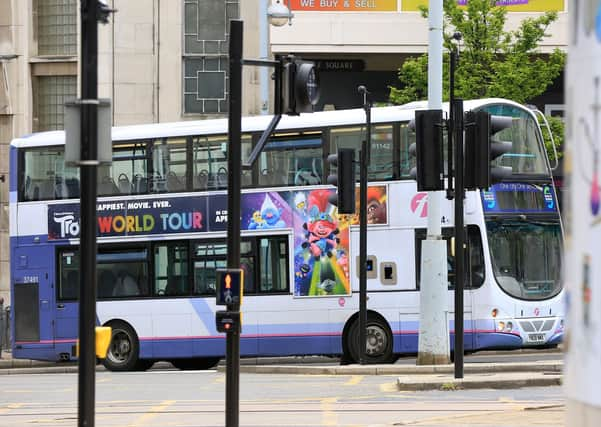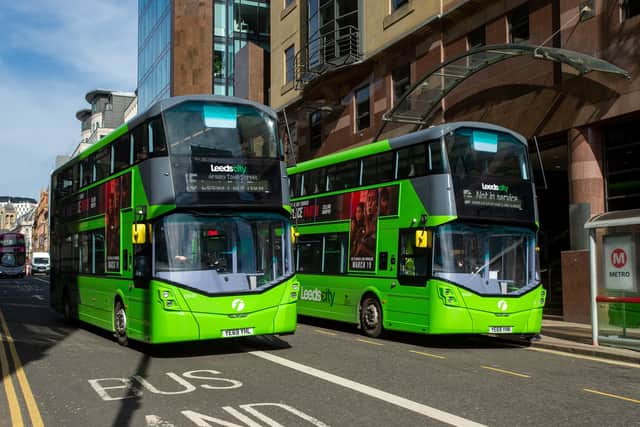How buses can drive greener recovery for region – Claire Haigh


The fundamental role of mass transit in facilitating economic activity is as essential today as it ever was.
Before Covid-19, the bus was the main mode of access to city centres, responsible for a third of city-centre expenditure. Bus commuters were generating £64bn in goods and services every year. However, the impact of the Government urging people to avoid public transport has taken its toll.
Advertisement
Hide AdAdvertisement
Hide AdBus patronage today is just a third of pre-crisis levels. Meanwhile the number of motorists is rising four percentage points every week.


From this month, employers are able to decide when their employees can go back to work in the office. The Government is relaxing its guidance on avoiding public transport but still encouraging people to use alternative transport.
Greener Journeys is calling on the Government to be more positive in its messaging and encourage the responsible use of public transport.
We must avoid the risk of replacing one health crisis with another. By discouraging use of public transport to ensure social distancing, we remove one of the most efficient ways to tackle air pollution, which causes 40,000 early deaths a year.
Advertisement
Hide AdAdvertisement
Hide AdFurthermore, recent studies have demonstrated a direct link between long-term exposure to air pollution and higher infection and death rates from Covid-19. A spike in air pollution from increased car use would aggravate any future respiratory pandemic.


If public-transport networks suffer long-term damage, there will be serious consequences. A 10 per cent decrease in public transport connectivity is associated with a 3.6 per cent increase in social deprivation. A third of people in the UK have deliberately caught the bus to have some human contact. Rising demand for car and van travel is one of the central reasons why carbon emissions from transport remain high. A double- decker bus can take 75 cars off the road.
A green recovery must have public transport at its heart. Investing in the bus would deliver a significant boost to the economy.
Research for Greener Journeys shows £2bn investment would generate 425 million additional bus journeys every year. Each £1 invested would generate £4.48 in wider social, economic and environmental benefits. All local authority areas in England outside London could expect to see at least a 20 per cent increase in patronage.
Advertisement
Hide AdAdvertisement
Hide AdInstead of building new roads, we should improve public transport and make better use of our existing roads through measures such as the workplace parking levy, city-centre entry restrictions and road pricing.
We must get the price signals right. At a time of low oil prices, the Chancellor should take the opportunity to increase fuel duty. The freeze in fuel duty since 2011 has led to five per cent more traffic, five million additional tonnes of CO2, 15,000 additional tonnes of NOx, a quarter of a billion fewer bus journeys and 75 million fewer rail journeys.
We need to move away from planning for vehicles to planning for people and places instead. The integration of public transport with new housing and land-use planning will be essential if we are to reduce emissions. New developments in urban centres well connected by public transport can stimulate 50 per cent more economic growth than developments located at the fringe, while dramatically reducing congestion and pollution.
Covid-19 has accelerated some structural changes in the economy that should be harnessed to assist in decarbonisation. For example, digitalisation has revolutionised how we participate in the economy.
Advertisement
Hide AdAdvertisement
Hide AdThere is a powerful case for investing in broadband instead of roads. But we will also need a more efficient system for freight. Otherwise growing internet shopping will bring roads to a standstill.
Decisions about where we work, how we purchase goods, how we travel or whether we choose to travel at all are going to be critical in determining whether we bring emissions down to a safe trajectory.
It’s time for a major shift from private transport to public, shared and active travel. The forthcoming National Bus Strategy must maximise the potential of the bus to tackle pollution, reduce social deprivation and reignite the economy.
Claire Haigh is chief executive of Greener Journeys.
Editor’s note: first and foremost - and rarely have I written down these words with more sincerity - I hope this finds you well.
Advertisement
Hide AdAdvertisement
Hide AdAlmost certainly you are here because you value the quality and the integrity of the journalism produced by The Yorkshire Post’s journalists - almost all of which live alongside you in Yorkshire, spending the wages they earn with Yorkshire businesses - who last year took this title to the industry watchdog’s Most Trusted Newspaper in Britain accolade.
And that is why I must make an urgent request of you: as advertising revenue declines, your support becomes evermore crucial to the maintenance of the journalistic standards expected of The Yorkshire Post. If you can, safely, please buy a paper or take up a subscription. We want to continue to make you proud of Yorkshire’s National Newspaper but we are going to need your help.
Postal subscription copies can be ordered by calling 0330 4030066 or by emailing [email protected]. Vouchers, to be exchanged at retail sales outlets - our newsagents need you, too - can be subscribed to by contacting subscriptions on 0330 1235950 or by visiting www.localsubsplus.co.uk where you should select The Yorkshire Post from the list of titles available.
If you want to help right now, download our tablet app from the App / Play Stores. Every contribution you make helps to provide this county with the best regional journalism in the country.
Sincerely. Thank you.
James Mitchinson
Comment Guidelines
National World encourages reader discussion on our stories. User feedback, insights and back-and-forth exchanges add a rich layer of context to reporting. Please review our Community Guidelines before commenting.